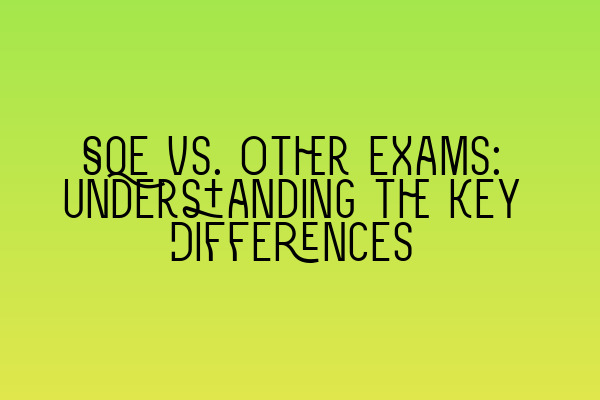SQE vs. Other Exams: Understanding the Key Differences
When it comes to qualifying as a solicitor in the UK, there are several exams and assessments you need to pass. One of the newest and most talked-about exams is the Solicitors Qualifying Examination (SQE), which will soon replace the traditional Qualified Lawyers Transfer Scheme (QLTS) and Legal Practice Course (LPC). In this article, we will explore the key differences between the SQE and other exams, helping you understand what sets it apart.
1. Structure and Format
The SQE is designed to be a more streamlined and practical exam. It consists of two stages: SQE1 and SQE2. SQE1 focuses on testing your knowledge of law and legal concepts, while SQE2 assesses your practical legal skills. Unlike the QLTS and LPC, which have multiple exams and assessments, the SQE combines both knowledge and skills assessment into a single examination process.
Related Article: SQE Prep: Essential Tips and Resources for Success in Property Practice
2. Flexibility
The SQE offers more flexibility compared to other exams. You have the freedom to choose when and where you want to sit for the exam. This allows you to plan your study and exam schedule according to your own pace and preferences. Additionally, the SQE is designed to be more accessible to candidates with diverse backgrounds, including those who have not completed a qualifying law degree.
3. Practical Focus
Unlike the QLTS and LPC, which place more emphasis on theoretical legal knowledge, the SQE puts a greater emphasis on practical legal skills. The SQE2 stage involves simulated exercises and assessments that mimic real-life legal scenarios. This practical focus ensures that candidates are prepared for the challenges they will face in the workplace, making them more equipped to handle the demands of a solicitor’s role.
Related Article: Interactive SQE Mock Tests for Property: Sharpen Your Skills for Exam Success
4. Cost and Time Efficiency
The SQE aims to be more cost and time-efficient compared to other exams. The exam fees for the SQE are expected to be lower than the combined costs of the QLTS and LPC. Additionally, the SQE allows candidates to progress through the qualification process more quickly. By combining the knowledge and skills assessments into a single exam, candidates can save time and resources.
5. Practical Experience
The SQE recognizes the importance of practical experience in becoming a solicitor. While the QLTS and LPC require candidates to complete a period of training known as a training contract, the SQE takes a different approach. Instead of a training contract, candidates are required to demonstrate a minimum of two years’ qualifying work experience. This allows candidates to gain practical legal experience through various legal settings, including law firms, in-house legal departments, and government organizations.
Conclusion
The Solicitors Qualifying Examination (SQE) presents a new and innovative approach to qualifying as a solicitor in the UK. With its practical focus, flexibility, and cost-efficiency, the SQE offers a more streamlined and accessible path to becoming a solicitor. By understanding the key differences between the SQE and other exams, you can make an informed decision about which route to take in your legal career.
Related Articles:

Leave a Reply